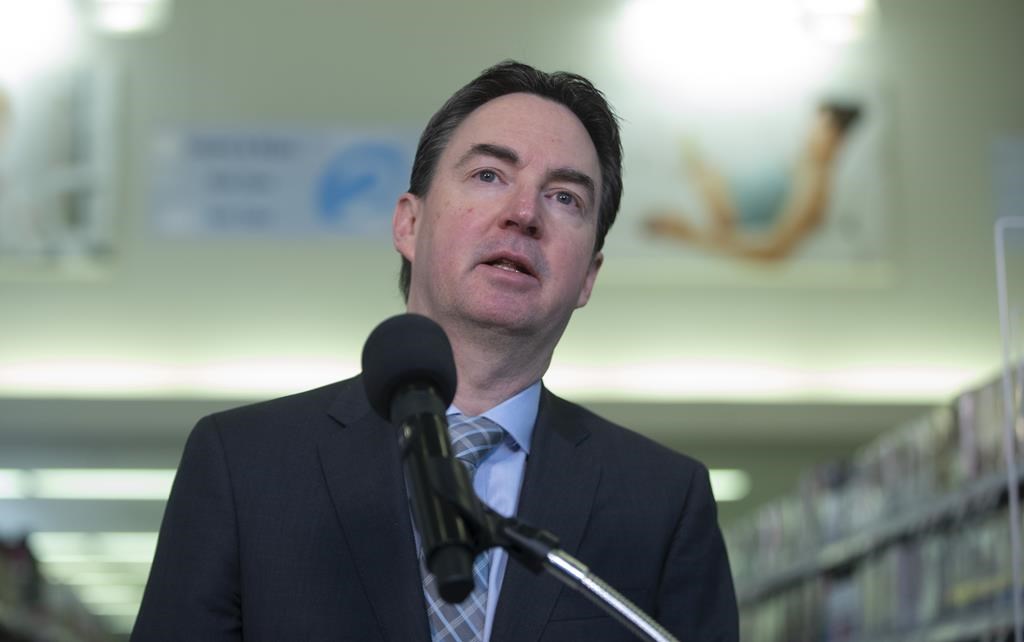Alberta’s health minister says there will be $158 million in the upcoming budget to attract more physicians and other health-care professionals to fill gaps in care.

Jason Copping says the workforce is stretched and that demands will only increase as the population ages.
The budget is to be delivered Feb. 28, and Copping says more than half of the $158 million will be used for programs to recruit physicians to rural areas, which are feeling the brunt of the doctor shortage.
Brian Jean, minister of jobs, economy and northern development, said financial incentives will be used as an incentive for practising in rural areas, along with other recruitment strategies that haven’t been announced yet.
An estimated 15 per cent of Albertans do not have a primary health provider, says the Canadian Institute for Health Information.

There will also be funds to help underserviced and remote communities, and money to bring in internationally trained nurses from the United States and United Kingdom.
With a provincial election in May, both the governing UCP and the Opposition NDP are proposing plans to recruit more physicians and other health specialists.

Get weekly health news
The NDP is promising to create health teams involving specialists, such as physiotherapists and licensed practical nurses working with physicians, thereby allowing the doctors to take on more patients.
Copping said details and targets on the incentive programs are to be rolled out after the budget.
“We don’t have an exact (target) number and that’s part of why this strategy is so important,” Copping said at a news conference.
“(We need) to work with everyone to make sure we have the numbers not only today _ and we know we need more _ but in the future, and we can plan accordingly.”
Copping said the numbers go beyond doctors and nurses.
“It’s not just about (Alberta Health Services), it’s about other employers in the continuing care space. They are having challenges — and we’ve heard this in rural areas as well — being able to attract and retain workers.”
With a provincial election in May, both the governing United Conservative Party and the Opposition NDP are proposing plans to recruit more physicians and other health specialists.
The NDP is promising to create health teams involving specialists, such as physiotherapists and licensed practical nurses working with physicians, thereby allowing the doctors to take on more patients.
Opposition NDP health critic David Shepherd said Copping is trying to clean up a mess that the UCP government made by tearing up the master agreement with doctors three years ago and seeking to cut nurses’ wages during the COVID-19 pandemic.
“It’s no wonder that health-care professionals have fled Alberta,” said Shepherd in a statement.
“The results of the UCP chaos are clear — dozens of rural hospitals partially closed, urban emergency rooms overwhelmed, ambulances delayed longer and longer, and a vast number of Albertans without any access to a family doctor.”
Earlier this week, the province revealed more details around a plan to invest more than $15 million to train and support more internationally educated nurses.
The plan, initially announced in October, includes $7.8 million in fuding to allow for students to access up to $30,000 in bursaries. The remainder of the funds will create 600 new seats for nurse bridging programs at Bow Valley College and Mount Royal University in Calgary and NorQuest College in Edmonton.
Also announced this week was a pilot project that would create a more efficient assessment system for internationally educated nurses arriving in Alberta, helping them start working sooner, the province said.
With the help of a $200,000 grant, an Alberta-based assessment facility will be established and the nurses can apply with the College of Registered Nurses of Alberta. Currently, international nurses must get their skills tested in B.C.
The program will assess the nurses and match them to one of three occupational nursing categories: registered nurses, licensed practical nursse and health-care aides.
“This will help streamline the credential process and reduce wait times for internationally educated nurses looking to join Alberta’s workforce,” the province said in a news release Wednesday.
The new assessment site is expected to open in fall of 2023.
— With files from Stephanie Swensrude, 630 CHED







Comments